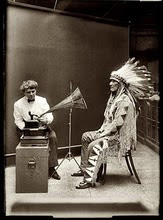Derrick Weston Brown pulls back his shoulder-length dreadlocks, clears his throat and introduces the U Street Poetry Jam: “Attention attention, the mic is now, and ever shall be open…Next up to the mic is you and you and you…” Freestylers, classical pianists, and artists heed his summons. A hushed audience of diverse faces follows the stage, overlooked by sepia portraits of Gandhi, Duke Ellington, and Ralph Nader. This is the Langston Room, the soul of the massive restaurant, bar, coffee shop and events space known as Busboys and Poets.
* * *
In 2005, Anas "Andy" Shallal, an Iraqi-American “artist, activist and restaurateur,” opened Busboys and Poets, hoping to establish a meeting place that would conjure the unique legacy of Washington, DC's U Street corridor, once known as “Black Broadway.”
A haven to haven to black musicians, entertainers and entrepreneurs in the 1950’s, U Street was immolated by the violent race riots following Martin Luther King, Jr.’s assassination. For an entire generation, the community was a ruin, and King’s legacy seemed burned to ashes with it.
“In the 1980s, this community was devastated by Reaganomics and crack cocaine,” said Law, “the transformation since has been incredible.” Like many other native residents, he experienced firsthand the double-edged effect of gentrification: “We had to move out to Maryland because it got so expensive, but I can still feel something special when I walk around this neighborhood.”
“Andy rooted this place in societal justice,” Maurice Chase, a Busboys manager, said of it’s founder. There are no titles among the management, and everything is decided by consensus. The staff files through the sofas and comfy chairs of the “community space,” displaying tattoos and piercings. After explaining the “biodynamic wine” and vegan desert selections featured on the menu, my Mohawked server Akon pointed to a series of murals he’d painted on the wall behind us. Between courses, I pursued the socially aware books in the in-house library run by the non-profit Teaching for Change.
And what of the name? It is in tribute to Langston Hughes, who was working as a busboy at the Wardman Park Hotel in the 1930s, when he slipped three of his poems to a patron. The guest was famous wordsmith Vachel Lindsay, who proclaimed in the papers the next day his discovery of a “Negro busboy poet.” The rest is history.
My own Salvadorian busboy Juan demurred on offering me any of his creative wares. However, Derrick Weston Brown, Busboys’ “poet-in-residence,” can be found in a corner of the library, scribbling prose, travel plans, and booking schedules in three Moleskin notebooks.
“Busboys is a community space for events that just happens to have food,” said Brown, “It’s like everybody’s living room.” Indeed, patrons come to find their muse, not for outstanding dining. Heavy in social awareness, the food and drink is regrettably rather light on quality.
You don’t find yourself minding, though—you’re steeped in a truly a magical space. The neighborhood’s recent flowering may draw upon a segregated past, but it looks forward to an idealistic future. Perhaps nowhere else can you find such an easy mingling of the many tribes of the District. “On election day, this place was packed every different type of person you can imagine—homeless people, professionals, college students—all silently watching the TV,” said Chase, “They were all unified.”
And whither the politicians whom they watched? “Politicians try to stay away from political spaces,” said Law. Though the president famously favors Ben’s Chili Bowl up the street, you’d be hard-pressed to spot any lawmakers or their staff here. “I can only think of one time I saw many conservatives here,” said Chase, adding, “This is a big spot for gays and lesbians.”
Busboys demonstrates too that a truly communal space is a promise, not a guarantee. “Last Saturday, the Beltway Atheists came in just as the Washington Catholic Archdiocese was hosting an event on atheism in the Langston Room,” said Law, “I tried so hard to get them together, but it didn’t work out.”
Here, Martin Luther King’s dream resonates still. On inauguration day, the streets outside erupted with an outpouring of hope. A pillar of the neighborhood for four years now, Busboys and Poets is holding an Obama-age America to its word—can you make your hope a reality over the next four?
* * *
It’s Thursday night again, and Brown smiles widely behind a microphone: “Calling all virgins to the mic. No sacrifices on this here stage. It’s all about gentleness and we will be gentle. The mic is now open…”




